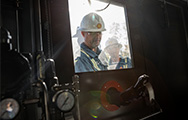Report Review Panel
We use an external review panel to strengthen our sustainability reporting. The panel helps evaluate and improve the quality and credibility of our Sustainability Report.
The 2019 Report Review Panel was comprised of five sustainability and corporate reporting experts:
- Faris Natour, Germany/USA. Founding Director, Human Rights and Business Initiative, University of California, Berkeley (Chair of the Report Review Panel)
- Andrew Logan, USA. Senior Director, Oil and Gas, Ceres
- Changhua Wu, China. Chief Executive Officer, Beijing Future Innovation Center
- Mandy Kirby, UK. Chief Strategist and Co-founder, City Hive
- Hilary Parsons, UK. Formerly Head of Creating Shared Value Engagement, Nestlé
You can read more about the panel members at www.shell.com/sustainability-report-review-panel.
The panel provided input into our topic selection process. They reviewed the report, discussed Shell’s reporting and spoke to relevant Shell employees to prepare their statement. The panel’s mandate focused on the quality of Shell’s reporting, including credibility, completeness and responsiveness.
Panel members are offered an honorarium for their input.
2018 recommendations and our responses
2018 Recommendations
UN sustainable development goals (SDGs): Integrate the SDGs more in Shell’s reporting. Use the goals more to clearly frame Shell’s strategic priorities and to connect the related steps being taken to meet its objectives.
How Shell responded in 2019
All the SDGs are relevant to Shell. We can make the greatest contribution to three (see UN sustainable development goals).
A new interactive table of contents has been added to the report’s homepage to direct readers to information related to the SDGs (see www.shell.com/sustainabilityreport).
We have also launched a new SDG page on www.shell.com/sdgs that contains more on our actions to support the goals.
2018 Recommendations
Balance: Provide more balanced internal and external voices in the report.
How Shell responded in 2019
We continue to include views on our activities, from inside and outside Shell. Several individuals have shared their perspectives from a range of organisations, different regions where we operate and some of our businesses and projects. We seek to further improve the balance in future reports by encouraging individuals to provide constructive feedback.
2018 Recommendations
Water: Provide additional targets and other measures Shell uses to minimise water risks for its operations at the project level.
How Shell responded in 2019
Water is managed at a local level and targets are not shared in the report. Case studies have been provided to give some insight into how water is managed at this local level. A new chart has been added to the report to show the source of fresh water that is withdrawn (see Water use).
2018 Recommendations
Plastics: Include more discussion of Shell’s role in addressing the global challenge of ocean plastics.
How Shell responded in 2019
The report features a number of new initiatives to address plastic waste, run by Shell and in collaboration with the Alliance to End Plastic Waste (see Plastics).
2018 Recommendations
Approach to sustainability reporting: Focus on integrating Shell’s strategic priorities under a clearly articulated sustainability strategy. This would also enable Shell to produce a more succinct report with the opportunity for more in-depth discussion and precise reporting on progress on strategic priorities.
How Shell responded in 2019
The 2019 report organises content under three themes: Responsible business, Sustainable energy future and Contribution to society. The commentary and case studies have been carefully appraised to correlate more closely with the results of the topic selection process and to reflect our key business decisions. There remains an opportunity to narrow the breadth of topics included in the report.
2019 recommendations letter
Report Review Panel statement
The Report Review Panel issues the following independent statement on Shell’s 2019 Sustainability Report.
“We have had the opportunity to review two drafts of the 2019 Sustainability Report and provide feedback to Shell through conference calls and in writing. Shell has responded to our questions and suggestions. In line with the scope of our review, our feedback focuses on the quality of Shell’s sustainability reporting rather than its sustainability performance.
Following our review of the 2018 Sustainability Report, the Report Review Panel recommended that Shell evolve its approach to its sustainability reporting with a clear focus on strategic priorities. We are pleased to see that Shell has developed a report that is more concise, clearly structured and puts greater emphasis on sustainability priorities under its three pillars of responsible business, sustainable energy future, and contribution to society. Throughout the report, it is evident that Shell has sought to address much of our feedback. We commend Shell on its continued commitment to transparency and on reporting its most material sustainability impacts.
Building on the work already undertaken, we see potential for Shell to more clearly articulate how its sustainability priorities intersect with its core business strategy to drive decisions, such as resource allocation and prioritisation. While we value the high level of detail in the report, Shell could more effectively convey the big picture of its place in society – including both risks and opportunities. Forming a clear sustainability strategy would strengthen Shell’s potential to engage readers who are not sustainability experts but are concerned about material issues such as climate change and ecological integrity. Similarly, Shell has an opportunity to demonstrate leadership by addressing growing concerns about the role that companies should play in society and to present a point of view on how business can help address society’s most pressing challenges.
For next year’s report, we see potential for innovation in measuring sustainability performance. We would also like to see Shell continue to provide more context and explanation for the metrics it already reports against so that readers are better able to assess changes in performance and progress towards long-term goals. We are pleased to see an emphasis in the report on safety and the steps Shell is taking to evolve its safety culture. This presents the possibility to develop new ways to measure and convey the impact of this change on Shell’s safety culture. We also welcome Shell’s disclosure on its sustainability-related partnerships. We would like to see more information on how and when Shell pursues such partnerships and how their impact is measured.
Finally, we welcome Shell’s continued commitment to include more internal and external voices in the report. We see an opportunity to further improve the balance of the report by including more diverse and critical points of view from independent voices and by articulating in more depth the potential challenges facing key business areas.
We would like to thank Shell for the opportunity to share our feedback here and throughout the drafting process and we look forward to reading Shell’s next sustainability report.”
 Climate change
Climate change
 Sustainable development goals
Sustainable development goals
 Safety
Safety
 About our data
About our data
